As the year draws to a close, Tim Wyatt looks at the most significant stories for the UK Church and beyond
Archie Battersbee
Twelve-year-old Archie died in August after a protracted legal battle between his doctors, who believed he was brain dead and should have his life support removed, and his family who thought he might still be alive.

Archie had been found unconscious at home with a ligature over his head in April. His case prompted profound ethical questions about life and death, and aroused the support of many, though not all, Christians. Archie himself had been increasingly exploring faith in the months before the incident, and was baptised by the hospital chaplain in his bed.
Despite the best efforts of the Christian Legal Centre, the courts ruled against Archie’s family, granting doctors permission to turn off life support in August. Hundreds of mourners attended his funeral.
Buffer zones
In October, MPs voted in favour of creating 150m buffer zones around all abortion clinics in England and Wales to make protesting and harassing or interfering with a woman attending the clinic a criminal offence. Many Christian pro-life campaigners decried this as an attack on free speech and the criminalisation of prayer.
Census results
The 2021 England and Wales census figures were published in November and revealed that, for the first time, less than half of the population described themselves as Christian.
Deaths
A number of high-profile figures in the Christian world died in 2022. Brother Andrew – famously known as ‘God’s Smuggler’ – the founder of the persecuted Church charity Open Doors, died in September aged 94. Beni Johnson, the co-leader of Bethel megachurch in California, died in July after a lengthy battle with cancer and despite a fervent prayer campaign by the church for supernatural healing.
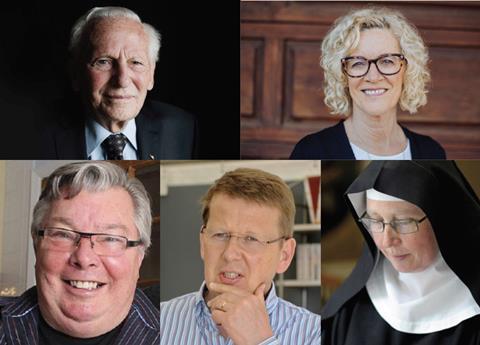
Gerald Coates, a highly influential leader in the house church and charismatic movements in Britain, died aged 78 in April. He led the March for Jesus in the 1980s and founded the Pioneer network of churches. Bill Turnbull, the Songs of Praise and BBC Breakfast broadcaster, died aged 66 in September.
The pioneering nun, Sister Catherine Wybourne, better known on Twitter as @DigitalNun, died aged 67 in February. She had become famous for sharing her monastic life online and for her love of all things digital.
Egypt hosted COP27
The Egyptian resort of Sharm El-Sheikh hosted 2022’s UN climate change conference, COP27. Despite much prayer and activism, Christian environmental groups mostly left disappointed with the lack of progress made during the talks, although international leaders did agree to create a compensation fund for poorer nations suffering the effects of climate change.
Franklin Graham’s UK tour
Two years after all eight venues on Graham’s attempted evangelistic tour of Britain cancelled his bookings, the American preacher and son of Billy Graham finally managed to complete his itinerary.
Graham insisted his ‘God Loves You’ tour was simply presenting the gospel, but the controversial evangelist has stirred up criticism from from inside and outside of the Church for his views on Islam and homosexuality. His organisation – The Billy Graham Evangelistic Association – won several legal battles after suing the 2020 venues that cancelled his first tour under pressure from LGBT activists.
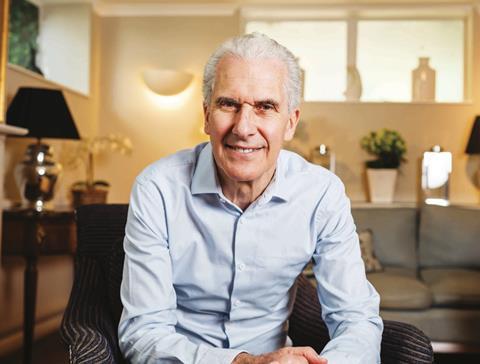
Gumbel retires
The long-serving leader of Holy Trinity Brompton (HTB) and Alpha, Rev Nicky Gumbel, retired in July after 17 years in the pulpit. Under his watch HTB became both the Church of England’s largest congregation and a church-planting behemoth, while Alpha spread around the world and now claims 30m people have taken part in 140 countries. He handed over to Rev Archie Coates, who had been vicar of St Peter’s, Brighton, one of HTB’s most successful church plants. Both leaders were profiled in Premier Christianity during 2022.
Hillsong leadership scandal
After a string of scandals, which included Brian Houston sending inappropriate text messages to women and a police investigation into allegations that he did not report the child abuse committed by his father, Brian and Bobbie Houston, the founders and senior pastors of Hillsong Church, were forced to resign in March. The Houstons later accused Hillsong’s board of forcing them out and treating them poorly.
Independent Inquiry into Child Sexual Abuse
Known as IICSA, the seven-year and £186m inquiry finally reported back in October. Seven of its 17 formal investigations were focused on Church institutions, including in-depth scrutiny of the Catholic Church, the Church of England, several bishops and Christian schools.
Among its recommendations was creating criminal penalties for those who do not report abuse, alarming some in the Church who feared this would interfere with the confidentiality of confession.
Jerusalem

Moves by Liz Truss to consider moving the British embassy in Israel to Jerusalem were strongly opposed by a coalition of Church leaders. A letter signed by the Church of England, the Church of Scotland, the Methodists, Quakers, Christian Aid and other groups urged the short-lived prime minister to abandon her plans, and followed a similar plea by patriarchs and bishops in Jerusalem.
The leaders said any such move could compromise negotiations to end the Israel-Palestine conflict, which may see Jerusalem become a shared capital between the two nations. But other Christians welcomed the news, arguing Jerusalem is the legitimate capital of Israel.
Kirill, Patriarch of Moscow
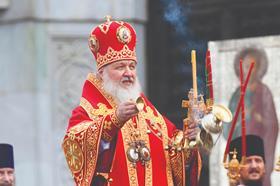
The head of the Russian Orthodox Church, Patriarch Kirill became the focus of scorn and anger across the world for his vehement support of Vladimir Putin’s bloody invasion of Ukraine. Despite millions of Ukrainians being members of his own denomination and widespread evidence of war crimes against civilians, Kirill still strongly backed the war and even claimed Russian conscripts killed in battle would have their sins forgiven automatically.
Lambeth Conference
The first such gathering of Anglican bishops for 14 years, August’s Lambeth Conference was inevitably dominated by arguments about sexuality. Many conservative Anglicans boycotted the event in protest at the pro-LGBT Western churches and their handful of gay bishops.
In the end, Most Rev Justin Welby, Archbishop of Canterbury, negotiated a tense truce between the two sides by officially acknowledging that Anglicans globally held two, contradictory beliefs on sexuality.
Mpho Tutu van Furth
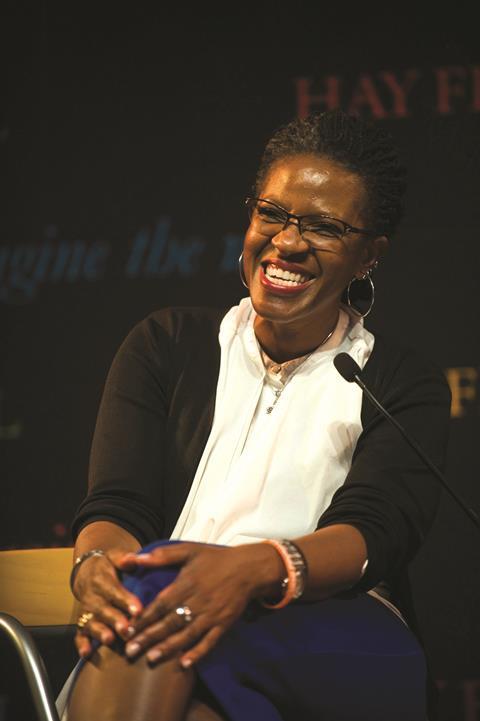
The daughter of anti-apartheid hero Archbishop Desmond Tutu was denied permission to preside at the funeral of her godfather in a Church of England church because she is married to a woman.
The local bishop explained that, despite Mpho Tutu van Furth being ordained in the Episcopal Church, she could not act as a priest in England because her same-sex marriage contradicted Anglican doctrine here. The inevitable backlash exposed the ongoing tensions within the CofE ahead of crunch debates on sexuality expected in 2023.
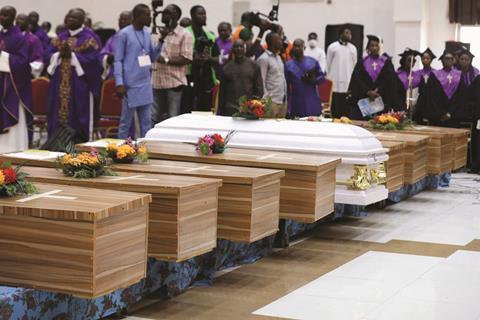
Nigerian persecution
Nigeria has long been one of the most dangerous places in the world to be a Christian, and violent attacks on believers culminated in a horrific massacre in June, when at least 40 worshippers were killed during a Pentecost service.
Islamist militants Boko Haram are increasingly attacking Christians outside its Muslim-majority heartlands in the north, and bombings and kidnappings of pastors are also common.
Oxford
Rt Rev Steven Croft, Bishop of Oxford, became the most senior figure in the CofE to back gay marriage in November. In a 52-page essay, he argued that it was right for evangelicals to endorse gay marriage in church. It prompted a fierce backlash from conservatives in his own diocese, who swiftly published their response restating orthodox doctrine.
Parliamentary prayer breakfast
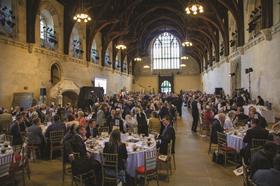
When Sajid Javid resigned as health secretary in July, he told colleagues and reporters that his actions were prompted by the Parliamentary Prayer Breakfast. He said Rev Les Isaac’s sermon, about the responsibility of leadership and integrity in public life, moved him to join the effort to force Boris Johnson’s resignation as prime minister. Johnson eventually quit two days later after a wave of further high-profile departures.
Queen Elizabeth II dies
In September, Queen Elizabeth II died shortly after marking 70 years on the throne. The passing of Britain’s longest-serving monarch led to an outpouring of grief and commemoration, including among the Church, which hailed her lifelong Christian faith and quiet spiritual leadership of the nation.

The Archbishop of Canterbury’s funeral sermon, which became the most-watched sermon of all time, praised her faithful service to Christ and urged the country to follow in her example.
Roe v Wade overturned
In a historic decision, the United States Supreme Court overturned its previous ruling in Roe v Wade and abolished the constitutional right to an abortion in June. This was in part the result of 50 years of activism by the Christian pro-life movement and was widely, although not universally, met with celebration by Church figures.
Scotland
The General Assembly of the Kirk voted 274 to 136 in May to allow gay weddings to take place in church for the first time. The Church of Scotland is now the seventh major denomination in Britain to allow either gay marriage or blessings since the law was changed in 2014.
Transgender
The culture war over transgender people did not abate in 2022, either in wider society or the Church. A Christian teacher was fired for refusing to call a trans child by their new name and pronouns, while Christian doctor David Mackereth continued his legal challenge to rules which compelled him to call trans patients by their preferred pronouns.
Ukraine war

In February, Russia launched an unprovoked invasion of its neighbour, Ukraine, leading to conflict, occupation, bloodshed and misery throughout the year. Ukraine’s Christians have held firm, famously reciting Psalm 31 in a Bible Society video during the first air strikes.
Christian leaders, including Most Rev Justin Welby, Archbishop of Canterbury, visited Kyiv to show their solidarity with Ukraine, while Christian charities such as Samaritan’s Purse have organised aid.
Vineyard USA row
The founding church of the Vineyard movement in Anaheim, California, announced in March that it would be leaving the movement, sparking outrage and shock from other Vineyard leaders across the world.
The Anaheim church, which is seen by many Vineyarders as the mother church of the network, was founded in 1977 by charismatic leader John Wimber, who led the movement until his death in 1997. Current leaders, Alan and Kathryn Scott, insist their departure was amicable but they are now being sued by Wimber’s widow, Carol, who accuses them of having financial motivations for seeking autonomy.
Warren retires
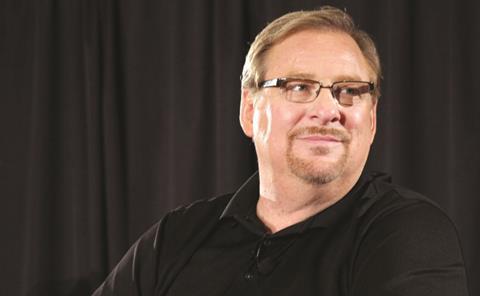
One of America’s most famous megachurch pastors, Rick Warren, retired in September after 42 years leading Saddleback Church, California. As well as growing the church to more than 20,000 congregants, Warren is well known as the author of the runaway Christian bestseller The Purpose Driven Life (Zondervan).
X eXtinction of churches
A Christian statistician modelled church decline in an attempt to predict when UK denominations would become extinct. His research, released in May, predicted that based on current trends, most would not make it past 2060. It also controversially suggested there was a correlation between churches in Britain that are growing and their rejection of same-sex marriage.

Young people
Amid widespread Church decline, there were some positive signs among younger generations. In a Church of England survey, more than half of 18-35-year-olds said they had prayed, significantly more than their parents’ generation.
A separate poll by Alpha reported most teenagers think positively of Jesus, describing him most often as “loving”, “trustworthy” and “generous”.
Zacharias report
A new independent report into the Ravi Zacharias scandal concluded that ministry leaders at Ravi Zacharias International Ministries (RZIM) “spiritually abused” junior staffers who tried to raise concerns about the late evangelist.
RZIM closed down after multiple rapes and sexual assaults by its founder were exposed following his death, but a group of fellow evangelists have accused its senior leadership of fostering a culture of deception and injustice while defending their boss.
Zacharias’ wife and son continue to maintain his innocence, but his daughter – the former CEO of RZIM – has expressed regret for not initially believing her father’s victims.




